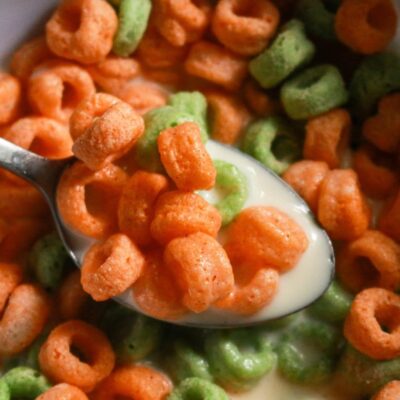No, Apply Jacks are not suitable for dogs. Apple Jacks are cereals made for humans, and their high sugar content and artificial flavors, especially xylitol, can be harmful to your furry friend’s digestive health and blood sugar levels.

Caution: This food is generally considered risky by the veterinary community. Dogs should not eat this food and should be monitored for adverse effects.
| Food Safety | Caution |
| Nutritional Issue | High sugar content, artificial sweeteners like xylitol |
| Potential Risks | diabetes, upset stomach, xylitol poisoning, pancreatitis |
| Symptoms | Diarrhea, vomiting, UTI |
How Much Apple Jacks Are Bad for Dogs?
Since Apple Jacks are not toxic, small amounts of breakfast cereal could not cause much harm. Hence, if your pup sneaked a few bites of your breakfast cereal, there is nothing to be worried about.
However, one serving of Apple Jacks contains about 13 grams of sugar, which is a very high amount for dogs to digest. Therefore, it’s best to avoid giving them large amounts or even small quantities of the sugary treat on a regular basis.
Common Apple Jack Ingredients
- Wheat:Wheat is the main ingredient in Apple Jacks; most dogs are allergic to wheat, which can lead to diarrhea, vomiting, and sneezing.
- Sugar:High sugar content in Apple Jacks may lead to digestive inflammation, diabetes, pancreatitis, and UTI in dogs.
- Artificial Flavors (Xylitol):Xylitol is a common artificial sweetener that can cause hypoglycemia and xylitol poisoning.
What Makes Apple Jacks Bad for Dogs?
Apple Jacks are packed with sugar content, which is extremely harmful to your canine best friend in the long run. Sugar leads to problems in the digestive tract, causing vomiting, diarrhea, and constipation. It may cause dental issues and also increase the frequency of UTIs (urinary tract infections) in dogs. And in the long run, increased sugar intake can lead to diabetes, pancreatitis, and obesity.
Moreover, xylitol is a common artificial sweetener that decreases the absorption of sugar in the bloodstream and may cause hypoglycemia in dogs. It is also toxic in high quantities and may cause xylitol poisoning.
Frequently Asked Questions
-
A small amount of cereal may not be toxic for dogs, but cereal should never be a meal replacement for your pooch.
-
One bite of Apple Jacks is not harmful if taken occasionally – if you feed one bite of the cereal daily, it can get dangerous in the long run.
-
In that case, look out for signs like diarrhea, vomiting, and indigestion caused due to excessive sugar intake. If the symptoms do not subside on their own, rush them to the vet as soon as possible.







